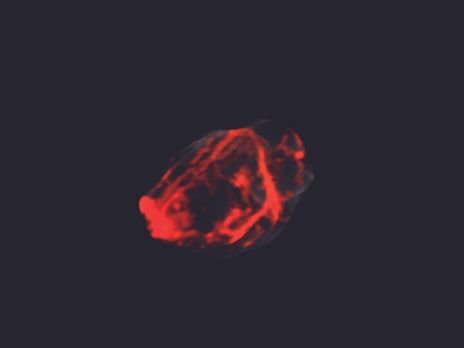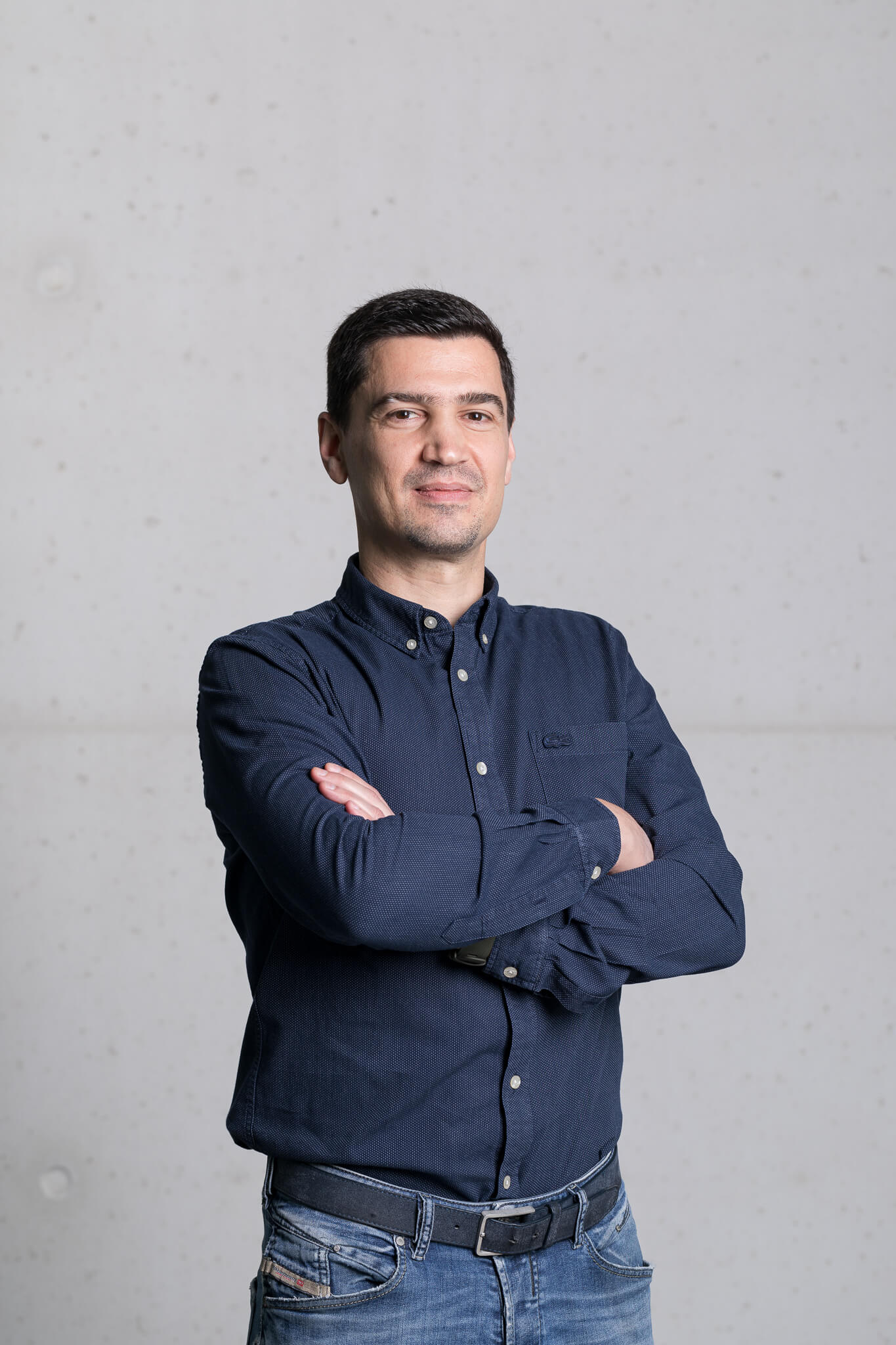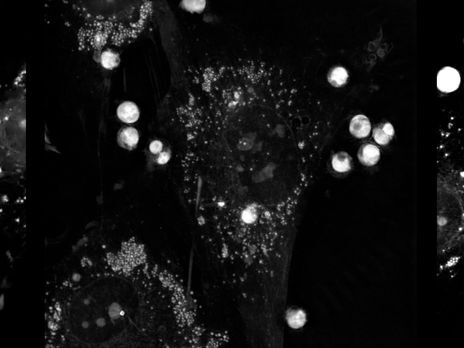
Exploiting novel oncogenic players in glioblastoma
Of all brain tumors, glioblastoma (GBM) is particularly devastating, being the most common and most malignant type. Using a wide panoply of biological samples, ranging from…

Bruno Costa (BC) is a Principal Investigator working at the ICVS, contracted by the School of Medicine, University of Minho (tenure track). He graduated in Applied Biology in 2003 and completed his PhD on cancer research in 2008. During his career, BC worked in various research groups in Portugal (University of Porto and University of Minho), in the Netherlands (Leiden University Medical Centre), and in the USA (University of California, San Francisco). He was granted various highly competitive positions, including an FCT Investigator position (starting grant) in 2013, a CEEC Assistant Researcher position in 2019, and secured a permanent position in December 2021.
In his research, BC is mainly interested in the study of molecular and cellular hallmarks of brain tumors, and how these can be translated into therapeutic and prognostic values, contributing to a precision medicine approach in brain cancer care. He has specialized in glioblastoma (GBM) research, a particularly devastating cancer with very poor and unpredictable clinical outcomes. Paradoxically, GBM patients are almost always treated with a “one fits all” standard approach, mostly because good prognostic and therapy response biomarkers are still lacking. Using a wide panoply of biological samples, ranging from preclinical in vitro and in vivo models, to primary tumor and biofluid samples obtained from patients, BC has been focused on better defining the heterogeneous molecular and cellular landscapes of GBM, identifying novel clinically-useful biomarkers, and exploiting novel therapeutic strategies to target key oncogenic features that may translate into better patient care.

Bruno Costa (BC) is a Principal Investigator working at the ICVS, contracted by the School of Medicine, University of Minho (tenure track). He graduated in Applied Biology in 2003 and completed his PhD on cancer research in 2008. During his career, BC worked in various research groups in Portugal (University of Porto and University of Minho), in the Netherlands (Leiden University Medical Centre), and in the USA (University of California, San Francisco). He was granted various highly competitive positions, including an FCT Investigator position (starting grant) in 2013, a CEEC Assistant Researcher position in 2019, and secured a permanent position in December 2021.
In his research, BC is mainly interested in the study of molecular and cellular hallmarks of brain tumors, and how these can be translated into therapeutic and prognostic values, contributing to a precision medicine approach in brain cancer care. He has specialized in glioblastoma (GBM) research, a particularly devastating cancer with very poor and unpredictable clinical outcomes. Paradoxically, GBM patients are almost always treated with a “one fits all” standard approach, mostly because good prognostic and therapy response biomarkers are still lacking. Using a wide panoply of biological samples, ranging from preclinical in vitro and in vivo models, to primary tumor and biofluid samples obtained from patients, BC has been focused on better defining the heterogeneous molecular and cellular landscapes of GBM, identifying novel clinically-useful biomarkers, and exploiting novel therapeutic strategies to target key oncogenic features that may translate into better patient care.
Papers:
– Martins EP, Gonçalves CS, Pojo M, Carvalho R, Ribeiro AS, Miranda-Gonçalves V, Taipa R, Pardal F, Pinto AA, Custódia C, Faria CC, Baltazar F, Sousa N, Paredes J, Costa BM. Cadherin-3 is a novel oncogenic biomarker with prognostic value in glioblastoma. Mol Oncol. 2022 Jul;16(14):2611-2631.
– Celus W*, Oliveira AI*, Rivis S, Van Acker HH, Landeloos E, Serneels J, Cafarello ST, Van Herck Y, Mastrantonio R, Köhler A, Garg AD, Flamand V, Tamagnone L, Marine JC, Di Matteo M, Costa BM, Bechter O, Mazzone M. PlexinA4 mediates cytotoxic T cell trafficking and exclusion in cancer. Cancer Immunulogy Research 2022 Jan;10(1):126-141.
– Boiteux EL, Court F, Guichet PO, Vaurs-Barrière C, Vaillant I, Chautard E, Verrelle P, Costa BM, Karayan-Tapon L, Fogli A, Arnaud P. Widespread overexpression from the four DNA hypermethylated HOX clusters in aggressive (IDHwt) glioma is associated with H3K27me3 depletion and alternative promoter usage. Mol Oncol. 2021 Aug;15(8):1995-2010.
– Mancini A, Xavier-Magalhães A, Woods WS, Nguyen KT, Amen AM, Hayes JL, Fellmann C, Gapinske M, McKinney AM, Hong C, Jones LE, Walsh KM, Bell RJA, Doudna JA, Costa BM, Song JS, Perez-Pinera P, Costello JF. Disruption of the β1L Isoform of GABP Reverses Glioblastoma Replicative Immortality in a TERT Promoter Mutation-Dependent Manner. Cancer Cell. 2018 Sep 10;34(3):513-528.e8.
– Gonçalves CS, Vieira de Castro J, Pojo M, Martins EP, Queirós S, Chautard E, Taipa R, Pires MM, Pinto AA, Pardal F, Custódia C, Faria CC, Clara C, Reis RM, Sousa N, Costa BM. WNT6 is a novel oncogenic prognostic biomarker in human glioblastoma. Theranostics. 2018; 8(17):4805-4823.
– Costa BM, Smith JS, Chen Y, Chen J, Phillips HS, Aldape KD, Zardo G, Nigro J, James CD, Fridlyand J, Reis RM, Costello JF. Reversing HOXA9 oncogene activation by PI3K inhibition: epigenetic mechanism and prognostic significance in human glioblastoma. Cancer Res. 2010 Jan 15;70(2):453-62.
– Costa BM, Ferreira P, Costa S, Canedo P, Oliveira P, Silva A, Pardal F, Suriano G, Machado JC, Lopes JM, Reis RM. Association between functional EGF+61 polymorphism and glioma risk. Clin Cancer Res. 2007 May 1;13(9):2621-6.
Awards:
– Award “Research Frontiers in Health Sciences” from Fundação Calouste Gulbenkian (2010).
Relevant Activities in Scientific Societies:
– Board Member of the Portuguese Association for Cancer Research (ASPIC), Portugal (2020).
Patents:
– A novel oncogene biomarker, method and uses thereof. WO 2019/207512A2. Inventors: Bruno M. Costa; Céline S. Gonçalves; Nuno Sousa. Date Issued: 31/10/2019 (WIPO – World Intellectual Property Organization).

Of all brain tumors, glioblastoma (GBM) is particularly devastating, being the most common and most malignant type. Using a wide panoply of biological samples, ranging from…

Glioblastoma (GBM) is a notoriously devastating malignant brain tumor, presenting remarkable intratumor heterogeneity. Despite aggressive treatments, it is universally fatal, with a median patient survival of…

Gliomas, the most common primary brain tumors, arise from the glial cells and typically exhibit bad prognosis. In particular, glioblastoma (GBM), the most common and aggressive…

Brain tumors have one of the highest mortality rates and rank 1st in average years of life lost among all tumor types. Among them, glioblastoma (GBM)…



Phone: +351 253 604 967
Fax: +351 253 604 809
Email: icvs.sec@med.uminho.pt
Life and Health Sciences
Research Institute (ICVS)
School of Medicine,
University of Minho,
Campus de Gualtar
4710-057 Braga
Portugal

Copyright ©2022 ICVS. All Rights Reserved



Copyright ©2022 ICVS. All Rights Reserved
Life and Health Sciences
Research Institute (ICVS)
School of Medicine,
University of Minho,
Campus de Gualtar
4710-057 Braga
Portugal



Copyright ©2022 ICVS. All Rights Reserved
Life and Health Sciences
Research Institute (ICVS)
School of Medicine,
University of Minho,
Campus de Gualtar
4710-057 Braga
Portugal

